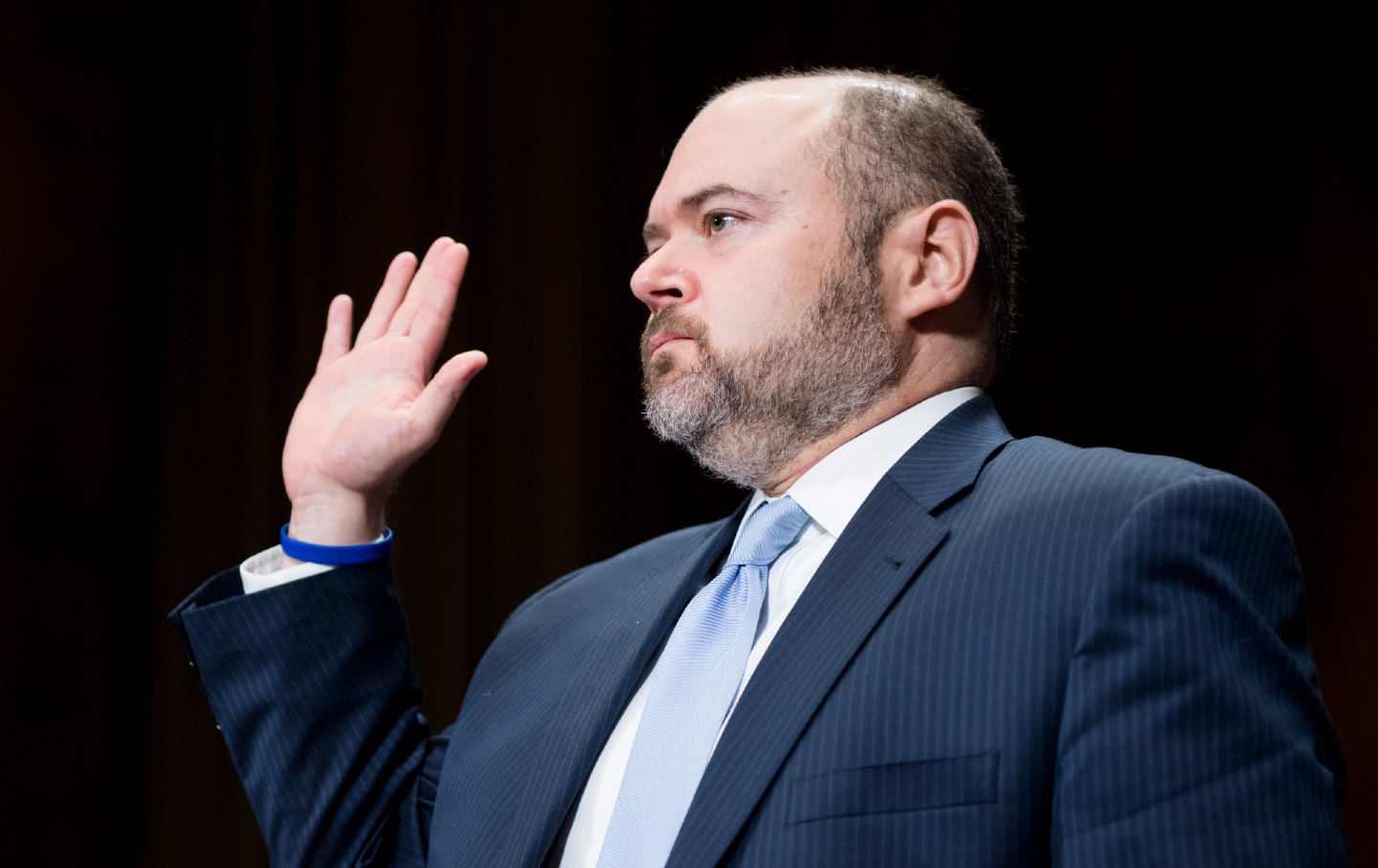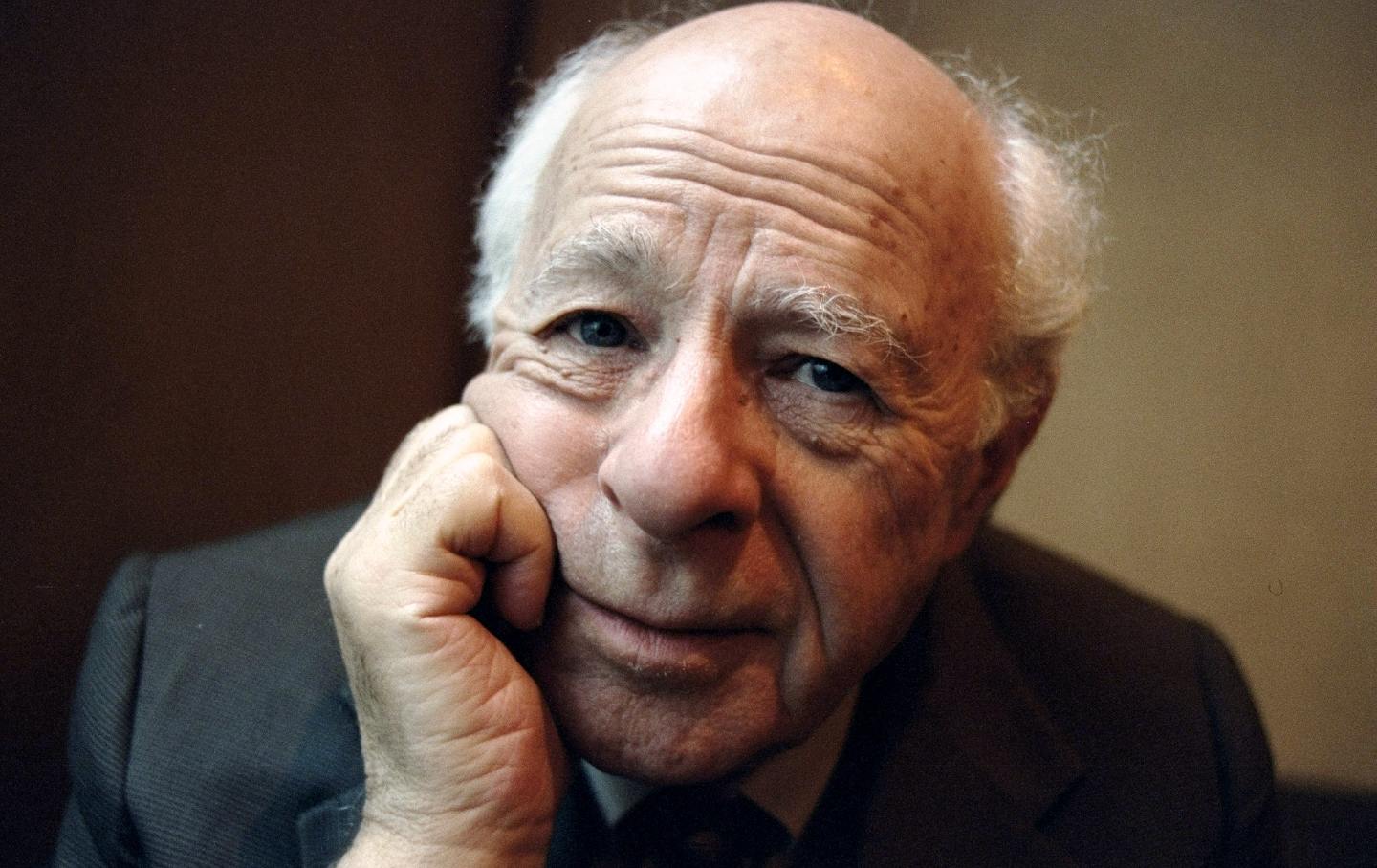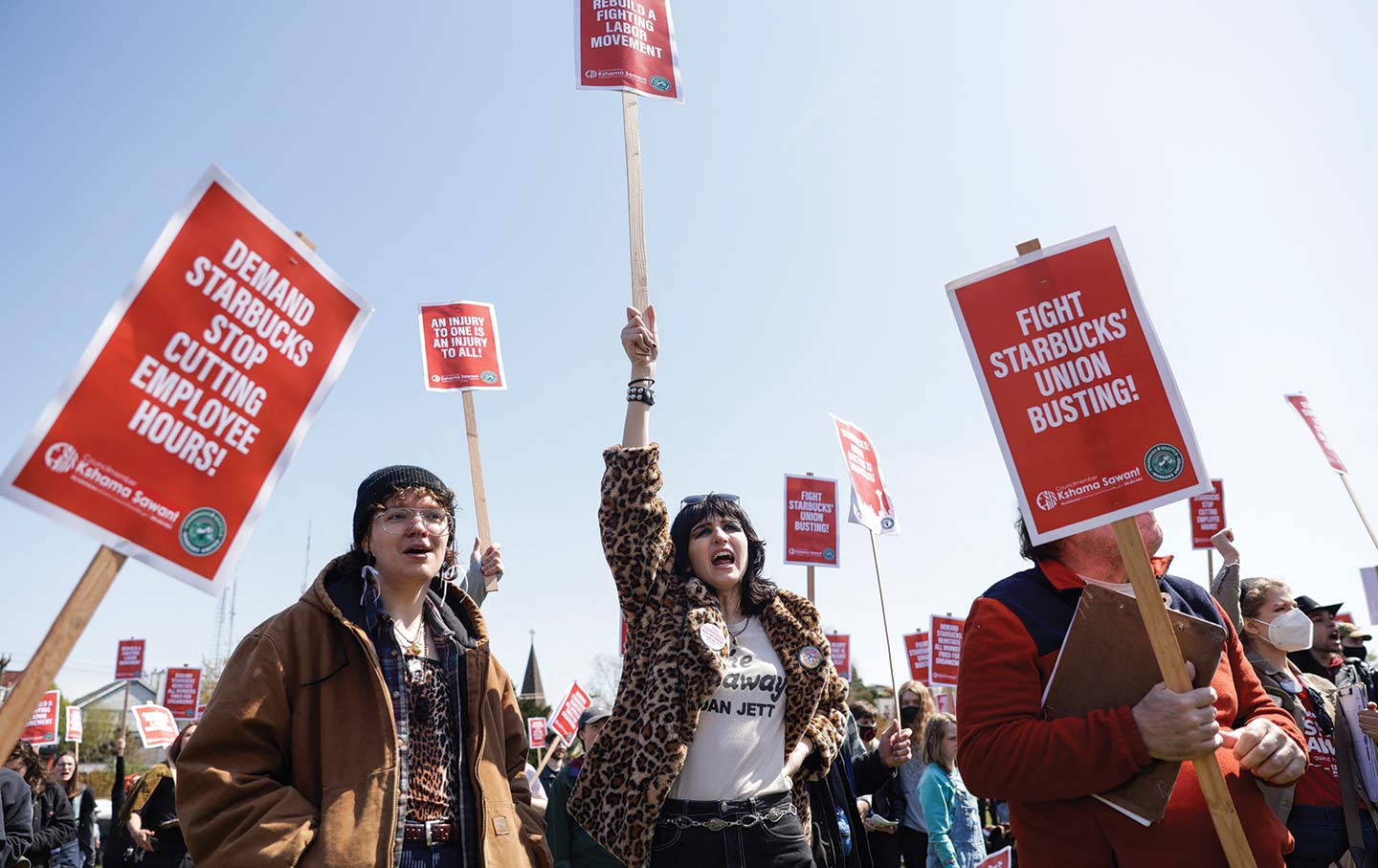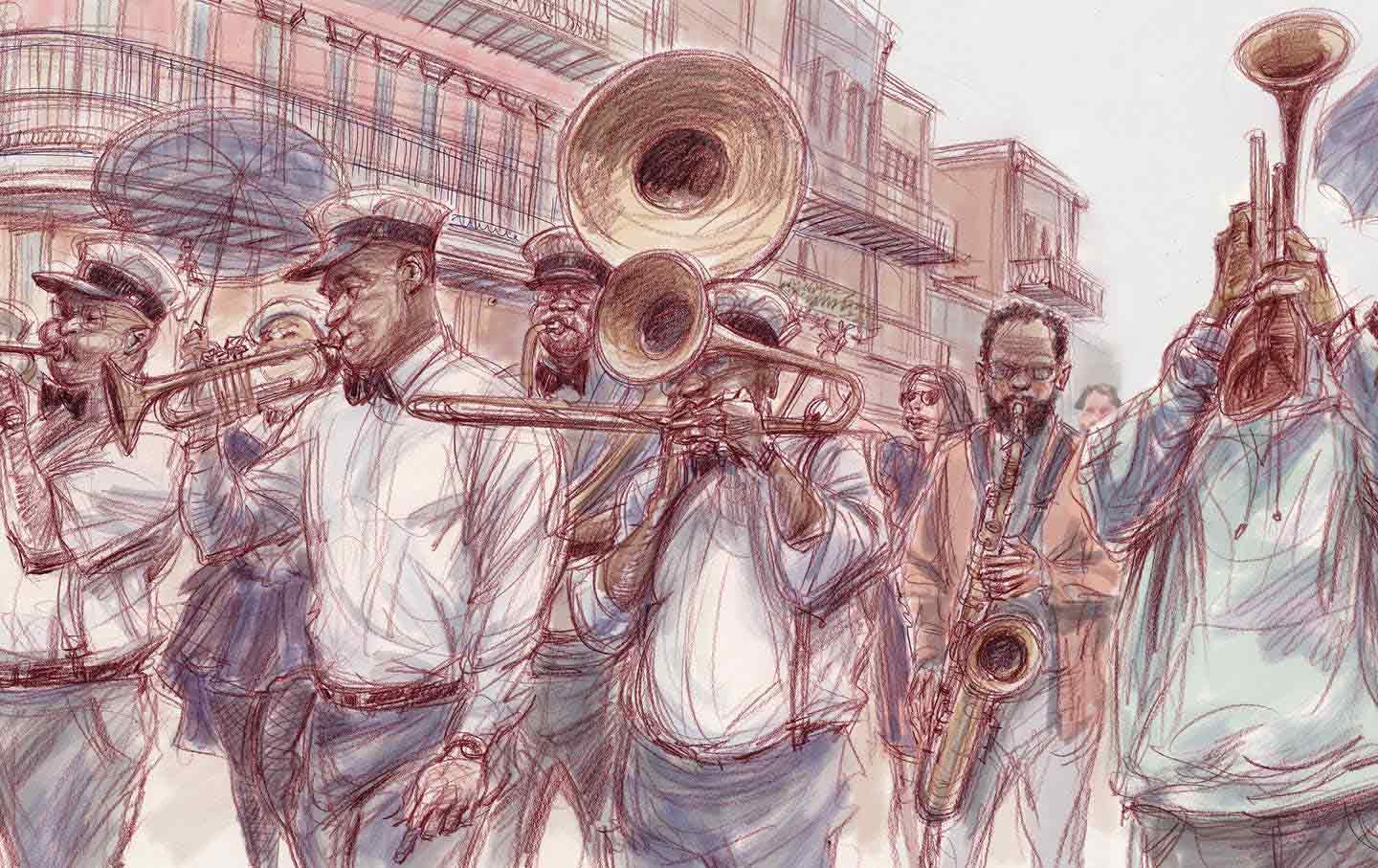A Rando Trump Judge Just Blew a Giant Hole in the Voting Rights Act
In a shocking decision, Judge David Stras joined with fellow GOP appointee Raymond Gruender to make the VRA virtually unenforceable in seven states.

In the movie The Matrix there is a famous interrogation scene. The hero (Keanu Reeves, playing Keanu Reeves) is being questioned by authorities, and asks for his constitutionally mandated phone call. The villain conducting the interrogation (Hugo Weaving, who hates the world of men in all movies) coldly responds, “What good is a phone call if you’re unable to speak?” He then glues Reeves’s mouth shut.
Last Monday, just before Thanksgiving, the United States Court of Appeals for the Eighth Circuit tried to pull a villain move on the 15th Amendment of the Constitution by gluing shut the mouths of Black people fighting for the right to vote. In a shocking and legally dubious decision, the circuit ruled in Arkansas State Conference NAACP v. Arkansas Public Policy Panel that private citizens could not sue to protect their voting rights under the law that is literally named The Voting Rights Act. Trump-appointed judge David Stras wrote the decision.
If the ruling is upheld, the attorney general of the United States will, functionally, be the only person in a position to challenge states that violate the voting rights of Black people. That means that whenever there is a weak AG like Bill Barr or Merrick Garland, red states will be free to go back to their Confederate roots and ignore the 15th Amendment’s prohibition against racism in voting.
I appreciate that talking about “the right to sue” can sound like fancy lawyer-talk, but our individual rights mean nothing if we can’t sue the government to protect them. What good is a constitutional protection against illegal search and seizure if you can’t sue the cops who break into your house without a warrant? What good is the constitutional prohibition against cruel and unusual punishment if you can’t sue the corrections officer who tortures you? Without lawsuits, constitutional protections are just suggestions that can be violated every time the government feels like ignoring them.
Indeed, there are entire organizations that exist to protect constitutional rights, mainly through the use of private lawsuits. You’ve heard of some of them. Every college professor who wants to say the N-word in class can run to the Foundation for Individual Rights and Expression (FIRE) if they are unfairly “canceled.” The ACLU literally exists to protect civil rights and civil liberties through the use of lawsuits. And just try, I dare you, to legislate a gun restriction to keep children safe from mass shooters, and watch as the private lawsuits from the National Rifle Association come in like a hail of bullets.
Of course, Stras isn’t trying to take the right to sue away from any bigoted website designer who doesn’t want to serve same-sex couples, or any white man who is angry that their mediocre child missed out on their first choice of a university. Instead, Stras is focused on stopping groups like the NAACP from suing on just one topic: voting rights.
In so doing, this ruling doesn’t merely weaken the Voting Rights Act; it makes the law functionally inoperable. At Vox, Ian Millhiser explained the consequences:
[O]ver the past 40 years litigants have brought 182 successful lawsuits under the Voting Rights Act. Only 15 were brought solely by the DOJ. So, if Stras’s unusual reading of the law were correct, nearly 92 percent of all of these victorious lawsuits should have ended in defeat for the plaintiffs.
Of course, that is the goal of Trump judges like Stras: to turn successful defenses of Black voting rights into victories for white supremacy. Stras, a former clerk for Justice Clarence Thomas, has long been an enemy of voting rights (voting repeatedly to uphold voter ID laws when he was on the bench in Minnesota) and has even written negatively about Supreme Court rulings upholding desegregation in schools. Stras was, predictably, on the list of Federalist Society–approved Supreme Court contenders that Trump shared with voters during the 2016 campaign.
Still, Stras did not invent this new way to overturn the 15th Amendment. All he’s doing is what Justice Neil Gorsuch, Trump’s first nominee to the Supreme Court, told him he could do. Gorsuch has long been angling to hear a lawsuit making this exact argument. He said as much in a concurring opinion in the 2021 case Brnovich v. DNC. That case took up voter restrictions in Arizona that, the record showed, were demonstrably racist toward Black people and Native Americans. But the court upheld those voter restrictions. At the time, I explained the court’s ruling as interpreting the Voting Rights Act to allow states to be a little bit racist, and only the conservative justices know how much racism is too much.
Gorsuch agreed with the majority opinion, but wrote a separate, one-paragraph opinion because he has an entirely different theory of how to fulfill his Trump-appointed duties of destroying the Voting Rights Act. Here’s his concurrence:
I join the Court’s opinion in full, but flag one thing it does not decide. Our cases have assumed—without deciding—that the Voting Rights Act of 1965 furnishes an implied cause of action.… Lower courts have treated this as an open question.… Because no party argues that the plaintiffs lack a cause of action here, and because the existence (or not) of a cause of action does not go to a court’s subject-matter jurisdiction…this Court need not and does not address that issue today.
You know how Republicans promote the fantasy that there is “debate” among climate scientists about the reality of climate change to keep the country ignorant and addicted to fossil fuels? That is what Gorsuch is doing here: He’s inventing a debate about whether the VRA allows for private lawsuits where no debate exists in Supreme Court precedent. When he writes “our cases have assumed—without deciding” to imply that there is an open question here, he’s leaving out the critical fact that the court has in case after case allowed lawsuits from private individuals or organizations to go forward under the Voting Rights Act. The court has decided that private lawsuits are allowed, because it has allowed them! Gorsuch’s concurrence is like me saying, “We have assumed—without deciding—that gravity exists. But some idiots, like me, have treated it as an open question, so I encourage someone to jump off of a roof to see what happens.” In this scenario, Stras is the guy who draped a bath towel around his shoulders like a cape and took the leap.
Popular
“swipe left below to view more authors”Swipe →The hope here is that when Stras’s opinion is reviewed by the Supreme Court (which it will be, not just because it flies in the face of 40 years of settled Supreme Court precedent, but also because other courts of appeal disagree with Stras), Gorsuch’s pet theory won’t be able to garner five votes. Clarence Thomas signed on to Gorsuch’s concurrence in Brnovich (because Thomas believes that Black people who don’t want to be bitten by dogs while they stand in line to vote simply don’t want to vote enough), but that was it. Alleged attempted rapist Brett Kavanaugh, Amy Coney Barrett, and Chief Justice John Roberts all had the option to throw their name onto Gorsuch’s toxic thought bubble, but declined.
I think (or hope, or maybe have an educated hope) that Stras will be overruled by the Supreme Court in the coming years, but that probably won’t happen before the next presidential election. Until the Supreme Court gets around to overturning this madness, or at least temporarily blocking the ruling, the Voting Rights Act will be frighteningly vulnerable in Arkansas, Iowa, Minnesota, Missouri, Nebraska, North Dakota, and South Dakota, which are the seven states covered by the Eighth Circuit.
The short-term harm could be somewhat mitigated if the Department of Justice and Attorney General Merrick Garland aggressively step in, file the lawsuits that only he is now allowed to file, and defend the constitutional rights of Black people in these states. But hoping for Garland to be “aggressive” is only one step removed from wishing upon a freaking star.
This is quite simply the problem with letting Trump judges run the country. Politicians like Joe Biden and Barack Obama are fond of telling people to vote… but Trump judges are aware of that clever strategy and have long-term plans to deny equal voting rights to Black and brown people. The Democratic Party establishment cannot just rely on people voting harder. At some point, it must come up with a plan to deal with the antidemocratic judges Trump left behind.
Disobey authoritarians, support The Nation
Over the past year you’ve read Nation writers like Elie Mystal, Kaveh Akbar, John Nichols, Joan Walsh, Bryce Covert, Dave Zirin, Jeet Heer, Michael T. Klare, Katha Pollitt, Amy Littlefield, Gregg Gonsalves, and Sasha Abramsky take on the Trump family’s corruption, set the record straight about Robert F. Kennedy Jr.’s catastrophic Make America Healthy Again movement, survey the fallout and human cost of the DOGE wrecking ball, anticipate the Supreme Court’s dangerous antidemocratic rulings, and amplify successful tactics of resistance on the streets and in Congress.
We publish these stories because when members of our communities are being abducted, household debt is climbing, and AI data centers are causing water and electricity shortages, we have a duty as journalists to do all we can to inform the public.
In 2026, our aim is to do more than ever before—but we need your support to make that happen.
Through December 31, a generous donor will match all donations up to $75,000. That means that your contribution will be doubled, dollar for dollar. If we hit the full match, we’ll be starting 2026 with $150,000 to invest in the stories that impact real people’s lives—the kinds of stories that billionaire-owned, corporate-backed outlets aren’t covering.
With your support, our team will publish major stories that the president and his allies won’t want you to read. We’ll cover the emerging military-tech industrial complex and matters of war, peace, and surveillance, as well as the affordability crisis, hunger, housing, healthcare, the environment, attacks on reproductive rights, and much more. At the same time, we’ll imagine alternatives to Trumpian rule and uplift efforts to create a better world, here and now.
While your gift has twice the impact, I’m asking you to support The Nation with a donation today. You’ll empower the journalists, editors, and fact-checkers best equipped to hold this authoritarian administration to account.
I hope you won’t miss this moment—donate to The Nation today.
Onward,
Katrina vanden Heuvel
Editor and publisher, The Nation
More from The Nation

The Longest Journey Is Over The Longest Journey Is Over
With the death of Norman Podhoretz at 95, the transition from New York’s intellectual golden age to the age of grievance and provocation is complete.

Organized Labor at a Crossroads Organized Labor at a Crossroads
How can unions adapt to a new landscape of work?

The Epstein Survivors Are Demanding Accountability Now The Epstein Survivors Are Demanding Accountability Now
The passage of the Epstein Files Transparency Act is a big step—but its champions are keeping the pressure on.

The Fight to Keep New Orleans From Becoming “Everywhere Else” The Fight to Keep New Orleans From Becoming “Everywhere Else”
Twenty years after Katrina, the cultural workers who kept New Orleans alive are demanding not to be pushed aside.

Breaking the LAPD’s Choke Hold Breaking the LAPD’s Choke Hold
How the late-20th-century battles over race and policing in Los Angeles foreshadowed the Trump era.

Mayor of LA to America: “Beware!” Mayor of LA to America: “Beware!”
Trump has made Los Angeles a testing ground for military intervention on our streets. Mayor Karen Bass says her city has become an example for how to fight back.


